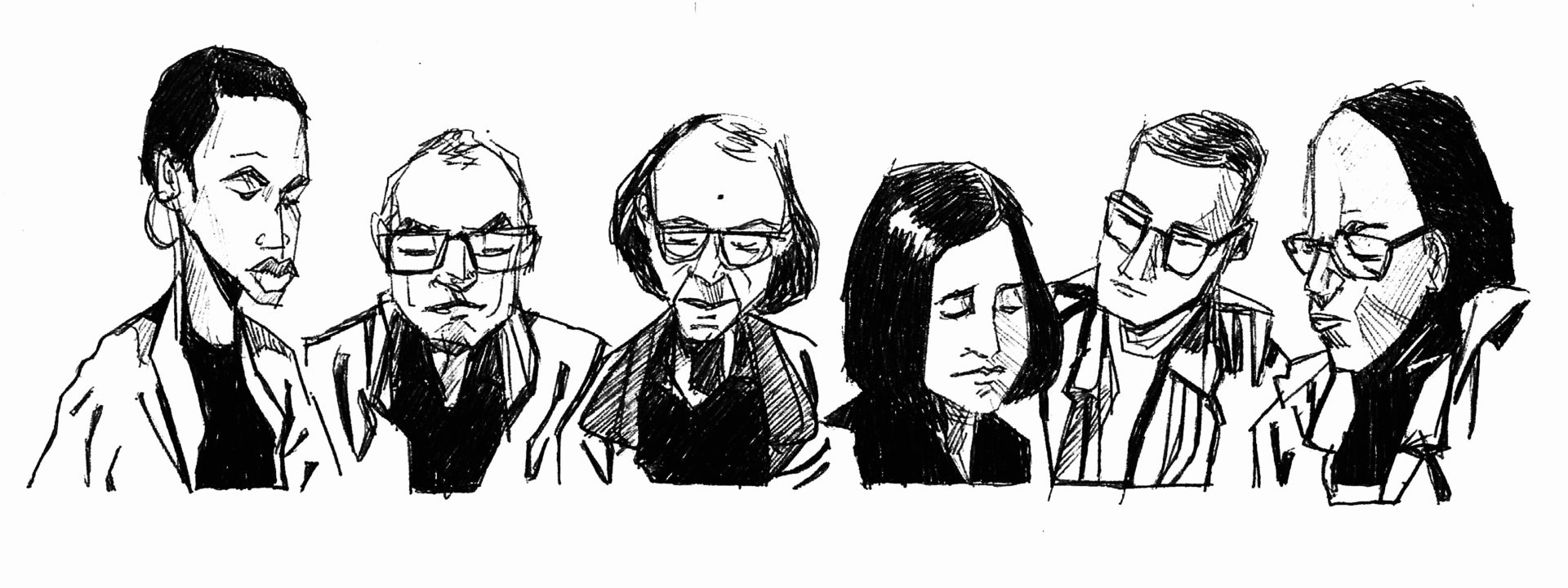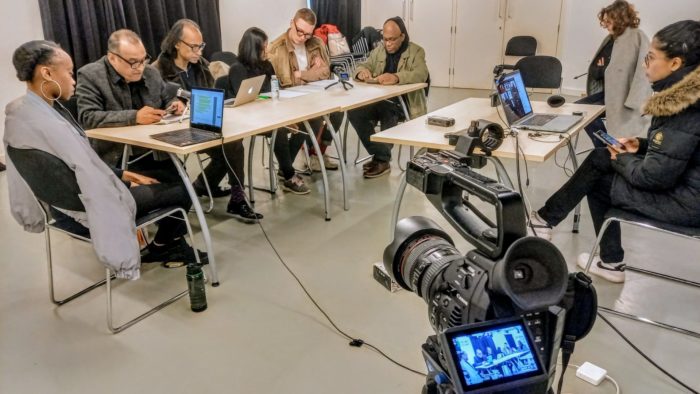Collaborative creation: Co-production through play-reading and community engagement

Left to right: Nicola Faye, Rez Kabir, Mukul Ahmed, Ashwini Kinhikar, Reed Stokes and Burt Caesar.
Sketch drawn by Graphic Artist: Edgar Lushaju
The experiences and perspectives of BAME families and communities from all over the country were taken back to Co-POWeR research participants this month, as actors read the first draft of the play breaDth to them over zoom.
The reading and feedback session was held at Birkbeck in London in a day long workshop where theatre director Mukul Ahmed, writer Raminder Kaur and dramaturg Alda Terracciano worked alongside five actors, Nicola Faye, Rez Kabir, Mukul Ahmed, Ashwini Kinhikar, Reed Stokes and Burt Caesar. This was a synergised activity between WP (Work Package) 5, which is producing different creative outputs based on the nationwide Co-POWeR research findings, and WP3, who conducted research among Black, Asian and Minority Ethnic families and communities on how COVID-19 has affected older people receiving care, and their paid and unpaid carers. This first meeting of participants, dramaturg, scriptwriter and performers was designed to explore the characterisation, narrative, pace and structure of the theatrical reworking of this Co-POWeR research from their different collaborative positions.
Research participant experiences and perspectives were synthesised in the play into multiple interconnected and interwoven narratives that expose the challenges, the love and the humour behind the stories of the lives of BAME families and communities. This had formed the core of WP3 research on care, caring and carers led by Shirin Rai with Jayanthi Lingham and Shahnaz Akhter. Stories from other WPs were also resonant including the young people of WP2 and themes raised by WP1 and WP4.
It was my responsibility to ensure the research participants attending on their laptops and phones from WP3 research communities, were able to hear and see the play reading and afterwards, offer their feedback to the researchers and theatre professionals in the room. I also filmed and recorded the read-through for future research and feedback purposes. WP3 and WP2 Research Fellows, Jayanthi Lingham and Teresa Peres were also present, supporting and engaging in the logistics and feedback process.
I am the last research fellow to join the Co-POWeR team in April 2022, and this was my first day on the job. It was an immersive induction in at the deep end. As an observer and documenter, learning about Co-POWeR in a particularly embodied and experiential way, I was struck by the attention of those watching and listening to the actors as they represented their personal experience through what seemed like a deep understanding of the various truths conveyed in the script that spoke to people’s real lives.
The participants, all with lived experiences of care and caring, and all from racially minoritised groups, including Somali and British Asian communities, were keen to see if their experiences of COVID-19, shared over the past year in in-depth interviews in WP3 had been effectively represented. In the feedback, those present agreed each saw aspects of themselves in the play and recognised the experiences of their families and communities in the characters and stories. “The play really looks like a daily lived life from different walks of life” one participant said, while another said the characters were “very real and relatable”. There were also some very helpful suggestions as to what was less effective in the script. From the feedback around pace and structure, for example, some scenes were subsequently shortened, others lengthened. Some of those attending needed clarifications to some of the connections between characters, and this too was responded to in the next draft of the play.
I too found myself both laughing and crying from behind my camera as I responded to the circumstances of the fictional characters. I was also moved by the commitment and passion of the performers entrusted to bring the experiences of BAME families and communities to theatre audiences.
During the feedback discussion, some of the actors shared their own experiences of losing loved ones during the pandemic and of treatment they experienced at the hands of the police when exercising or sitting in a park. Their ability to represent and embody the lives and experiences of others was fuelled by their own memories and emotions. So, the workshop itself became a further avenue for more research and the sharing of experiences.

Photo of WP5 theatre workshop by Karen Boswall. Including actors and director of the script reading of the play breaDth, WP5 Research Fellow Dr Alda Terracciano, workshop organiser and dramaturg, and WP3 Research Fellow Dr Jayanthi Lingham, facilitator of online participation.
The play is peppered with witty inter-generational, inter-racial and inter-cultural exchanges between a three-generation household shielding vulnerable elderly family members, a COVID-19 patient, a zero-hours contract health carer and his wife, and two doctors. In the second part of the workshop, the participants left the zoom call and the exchanges of characters and themes were reworked through repetition, the delivery and pace changing, and sometimes even the order. This proved to be an extremely useful collaborative and creative process.
Another objective of this read-through was to ensure the core findings of the research were brought out effectively in the play through the narratives and the characters and their relationships with one another. It was important that links were made between experiences of the research participants and the ideas explored in the research. For example, the connection between the COVID-19 pandemic and the different ways social oppression can be associated with seeing certain people as ‘diseased’ or ‘vermin’. One of the first pogroms against Jews in Germany, Raminder reminded me during a conversation about the script, was in the 1330s, during the time of the Black Death. This vitriol also extended to anyone else who were demarcated as ‘others’. Connected to this, an important theme explored in the play is the pathologisation of disease in racialised individuals and communities and how this adds to the racism already present in a society.
Other findings from the research were more contemporary, however. For example, interviews across the country highlighted the resilience and agency of BAME carers who are surviving in the face of structural inequalities and racism and the fundamental role they play in sustaining society including key roles as in care work. “They are treated like they’re worthless” Raminder told me when discussing the research findings that she felt crucial to incorporate into the script, “yet without them, people will just disappear and disintegrate for lack of attention”.
The workshop encouraged her to exaggerate the contrasting pace of the life of such carers, including “slow evolutions where nothing much seems to change”, yet where there is potential for change, with the occasional “fast paced frenzies”. Such ideas exploring time and the links between past and present are also reflected in the play through stillness and metaphor. A woman sits quietly in the family home and never moves, “yet she is creating a wonderful long scarf”, Raminder points out, and a man we don’t see as he is in isolation upstairs, is “a very lively little character”, bringing an energy to the family and to the script.
The R&D (Research and development) staging of the play is in London on May 23rd at the Brady Arts Centre, and on May 24th at Birkbeck University as part of the Birkbeck School of Arts Arts Week. It will also be filmed and screened for further national and international engagement in the summer.
To book events:
breaDth (Research and Development Performance) - ONE NIGHT ONLY 23 May 2022, 19:30
breaDth - part of the Birkbeck School of Arts Arts Week 24 May 2022, 18:00
For more information:
Blog post by Karen Boswall
